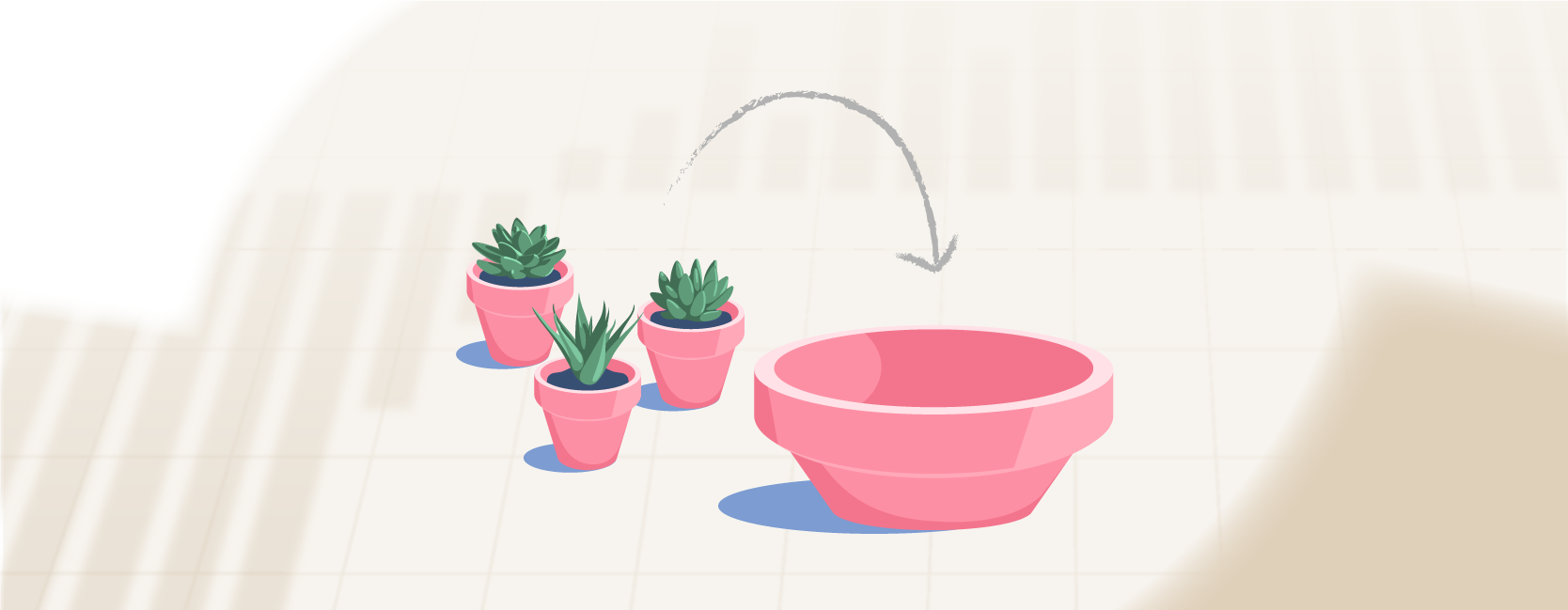Can you cash in small pension pots? To find out, please continue to read this Moneyfarm Insights blog. It will tell you everything you need to know about the taxes and the rules and regulations that apply to cashing in lesser-sized pension pots.
If you would like help with getting your retirement planning right, we at Moneyfarm are here for you. Depending on your age, retirement might seem a long way off. However, more people are now asking about how to retire at 55, and we can help you with that.
This blog’s main focus is cashing in small pension pots. For a more general pension guide, please click here.
| What is a small pension pot? | A pension pot of £10,000 or less |
| How many times can I take out a 25% tax-free lump sum? | Once, for each pension pot |
| Are small pension pot funds taxable? | Yes, they are |
| Types of small pension pots rules? | •Small lump sum rules •Trivial commutation rules |
Workplace pensions can generate several small pot lump sums
To make sure people started saving for their retirement in good time, between 2012 and 2017, the government introduced auto-enrolment to workplace pensions for anyone aged between 22 years old and State Pension age (currently 66 but rising to 67 from 2026) who earns over £10,000 per annum.
While the scheme is very beneficial, if you change employers throughout your working life, you can end up with several small pot lump sum caches. So, it can not only get quite messy, but it might also mean your retirement money is not working as well for you as it might.
This blog will explain the small pots pension rules that apply in 2025 and how you can go about cashing in small pension pots under 55. It may also interest you to read about pension transfer as a way of realigning your pension options.
What is a pension pot?
“Pension pot” is the term used to describe the total value of pension contributions that you and, in many cases, your employer have paid into a pension scheme to help fund your retirement. This “pot” also includes any capital growth the contributions had earned dependent on the structure of the fund when it was set up.
Pension pots (you can have any number) do not include the state pension you are due to get from the government upon your retirement.
Your pension fund provider should provide you with an annual pension statement indicating the size of the pot. In addition, some providers allow you to check the value on their websites.
If you have more than one pot, you will have to get in touch with each fund provider for a statement relating to that specific fund.
The benefits and drawbacks of small pension pots
In the finance and personal investment world, a small pension pot is one that contains £10k or less. While £10k is not generally considered to be a small amount of money, it is when talking about pension pots. As mentioned above, having multiple smaller-sized pension pots is a phenomenon that has manifested through auto-enrolment and the modern-day tendency to change employment more frequently than was once the case.
The drawbacks have been outlined in the previous section and are quite easy to understand. But there are some benefits, too. The first and most obvious one is that having a number of small pension pots is far more preferable than having none. It’s surprising how many people have none. It’s usually down to either not qualifying because of low pay or short lengths of employment (under 3 months) or being self-employed.
The other potential benefit of having several smaller pension pots is being able to manage them in a way that best suits your investor profile and your financial goals.
Strategies for managing multiple small pension pots
If you have multiple small workplace pensions, you don’t have any input as to what they’re invested in. That is usually down to the trustees and the pension providers. There are only two things you can do in terms of managing them.
- Check on them regularly to see how they are performing.
- Think about transferring or amalgamating them.
If you have several SIPP pensions, that is a different proposition. SIPPS can offer a good opportunity if you have investment experience and want to make your own decisions. But if you’re uncertain about how to manage or contribute to the management of a SIPP yourself, it would be preferable to seek out expert advice. By doing so, you can learn more about how a SIPP could fit into your retirement plans and get help with navigating the complexities of SIPP investment.
How to consolidate small pension pots: step-by-step guide
The step-by-step guide shown below describes how you can go about combining pensions. It relates to both large and small pots. It also applies to SIPPs should you happen to invest one either in addition to your workplace pension, or instead of if you’re self-employed. Begin by tracking down all types of pensions you have. This encompasses defined contribution or defined benefit pensions, as well as SIPPs
- Write down the policy numbers.
- Get in touch with the pension provider(s).
- Give the details of the pensions you’ve found to the pension provider(s). If you encounter any problems identifying a pension or checking the details, you can chat with the appropriate employer.
- In terms of defined benefit pensions, the trustees responsible for operating the scheme should be able to provide you with a final cash equivalent transfer value (CETV). Once you’ve got it, the money can then be transferred. You should bear in mind that this process can take as long as 9 months.
- Get in touch with your new or current pension provider to advise them you wish to transfer another pension to an existing or new pension scheme. Give them any details they request, which may include an estimation of the pension or pensions’ worth.
Basically, that’s it as far as knowing how to combine pensions is concerned. The rest of the process is down to your selected pension provider. If you need assistance or financial advice the team here at Moneyfarm will be pleased to assist.
Is it possible to cash in small pension pots?
Yes, it is possible to encash smaller pension pots but there are two sets of pension small pots rules you need to be aware of that can apply depending on the circumstances. They are:
- The small lump sum rules
- The trivial commutation rules
We will take a short look at each in turn
Small pension pot rules
Taking funds from lesser pension pots is permissible if you are aged 55 or over and the lump sum in question is no more than £10,000. If we are talking about personal or stakeholder pension schemes, then the small pension pot rules say you can take three such lump sums in your lifetime. There is no ceiling on the quantity of unrelated occupational pensions that you can commute in this way.
Trivial Pension Rules
If you are aged 55 or over, the trivial pension commutation rules permit you to take no more than £30,000 worth of pension rights from a defined benefit pension.
So, in theory, if you were to take your three small lump sums of up to £10,000 first, and your remaining defined benefits scheme rights total £30,000, you could also take those funds out, giving you access to up to £60,000 in total.
There is one important provision, however. The 12-month rule applies to the trivial pension pot withdrawal rules. If you’re cashing in small pension pots from several funds, the withdrawals must be made within 12 months of the date of the first encashment.
Are small pension pot funds taxable?
Unfortunately, cashing in small pension pots has tax implications. It is considered income and could, therefore, be liable for income pensions tax during the tax year it is encashed. The usual tax bands apply. Any small pension pot cash-in that tips the scales over the £12,570 basic tax annual threshold will attract income tax.
Does the 25% pension pot withdrawal tax-free rule apply annually?
It would be nice if it did, but unfortunately, it doesn’t. You cannot take 25% tax-free cash every year. You are only entitled to a 25% commuted lump sum from each pot once and once only. After that, you can take smaller amounts each year tax-free, but as soon as the total you have withdrawn reaches 25%, anything after that, you will have to pay tax under normal income tax band rules.
But on the plus side, although the remaining 75% of your pot(s) will be considered taxable income, you don’t have to pay National Insurance. You stop paying NI contributions when you reach the state pension age.
Can You Cash in a Small Pension Annuity?
If you have a very small annuity under £10,000 in value, it is possible to cash it in, but only if your fund provider permits you to do so.
Can you cash in small pension pots before 55?
Cashing in small pension pots under 55 is only permissible under certain special conditions. They are if you have been diagnosed with severe, debilitating ill health or a terminal illness.
Conclusion
In addition to state and workplace pensions, there are many ways you can invest money for your retirement. It is a complex subject, and you are best talking to an experienced financial adviser specialist like Moneyfarm.
We can advise you on which type of personal pension would suit you best, discuss cashing in small pension pots, explain trivial commutation lump sum etiquette, and tell you about the rules for small pot lump sums.
Our aim is to make sure that when you reach retirement age – whenever that might be – your personal pension will afford you the lifestyle to which you aspire.
FAQ
What’s a small pension pot in the UK?
A small pension pot is generally considered to be one that holds £10,000 or less.
Can I take my small pension pot in a lump sum?
Yes, you can take the total amount of £10,000 as a ‘small pot lump sum’. You can take out a total of 3 small pot lump sums worth £10,000 each from non-occupational pensions in your lifetime.
Is it worth combining small pension pots?
Yes, it is worth combining them. Consolidating them makes them much easier to manage and monitor. You can also potentially save money on charges such as administrative fees.
*As with all investing, financial instruments involve inherent risks, including loss of capital, market fluctuations and liquidity risk. Past performance is no guarantee of future results. It is important to consider your risk tolerance and investment objectives before proceeding.





